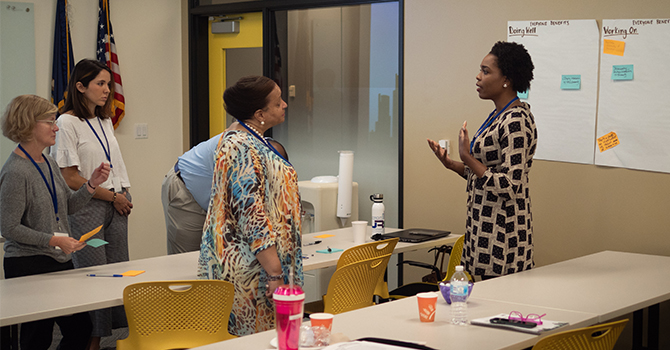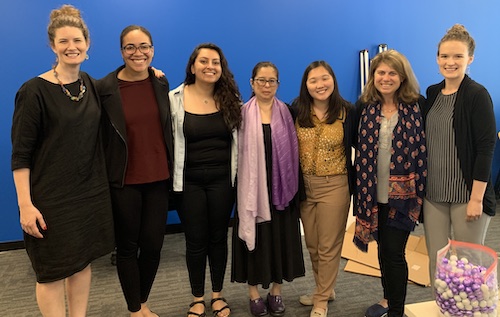Fostering Health Equity through Community-Based Participatory Research

Katherine Corbit
Master's Student in Health Behavior and Health Education; Research Assistant, Detroit Urban Research Center
Community-based participatory research (CBPR) is a well-established research approach that emphasizes equity by utilizing organizing principles and integrating community within every aspect of the research process.1 This holistic approach to research recognizes the power of community participation.1 On the surface, research based in the community may not seem that different from CBPR. However, the level of engagement of community within the research process is where traditional research and CBPR differ. Whereas traditional research views a community as a place to conduct research “in,” CBPR views community as a unit of identity to conduct research “with” beyond just the recruitment or feedback phase.2,3 The principles of CBPR are based within the premise of co-learning where both community and academic partners’ strengths and capacity needs are acknowledged.2 Through this approach, the hierarchy of knowledge that prioritizes academics over community is replaced instead with knowledge democracy, which values each partner.4 Since community and academic partners are both equally respected, the overall goal of CBPR research is focused on shared values and mutual benefits for all partners.2
The CBPR approach further fosters health equity because it not only centers community within the research process but also cedes power to community.4 This approach embraces cultural humility and recognizes that community in all aspects of the research process increases participation, strengthens validity, and enhances overall quality.4 Incorporating and engaging community adds local relevance for addressing the root causes of health inequities which increases the likelihood of sustainability and commitment from the community once research projects conclude.5 CPBR fosters health equity because this approach emphasizes long-term commitment, co-operation across organizations and sectors, and action upon dissemination of research findings.6,7
As health inequities continue to increase, there is an ever pressing need for action. CBPR is an appropriate response to address some of the most pressing public health issues of our time. CBPR recognizes the complexity of health inequities by acknowledging that no one sector, discipline or organization can achieve health equity alone and that there is no simple solution or cookie-cutter approach for successful CBPR partnerships and research projects. Change, instead, requires collective effort of multiple partners from multiple sectors tackling issues and making an impact across the social determinants of health.6,7 Change will not come easily, therefore, a well-trained public health workforce and community is needed to implement this approach.
The University of Michigan School of Public Health offers students like myself opportunities to learn and engage in CBPR both inside and outside the classroom. The Detroit Urban Research Center (Detroit URC) is a research center involving community-based organizations, health and human service agencies, and researchers from the University of Michigan and Detroit with numerous faculty and students involved from the School of Public Health. A leader in both CBPR implementation and facilitation for the last 24 years, the Detroit URC offers training and opportunities for community and academic partners to build skills in implementing a CBPR process and knowledge to help unlearn the scientific hierarchy of knowledge taught in traditional research courses. Critically, The Detroit URC recognizes that communities are not generalizable and practice-based evidence is just as valid as evidence-based practice.
 Through my work with the Detroit URC and participating in opportunities like this
year’s “Promoting CBPR toward Achieving Health Equity” Symposium—the culmination of 5-years of the National Institutes of Health funded program, Community-Based Participatory Research Partnership Academy—I have a better understanding of how CBPR partnerships look in practice and the importance
of spending time developing processes prior to implementing partnerships. These practical
insights provide context for the theories and methods I have learned during my first
year as a student at Michigan Public Health and will continue to inform my work for
years to come. As the field of public health continues to try and address health inequities,
practitioners and researchers will hopefully turn to centers like the Detroit URC
in order to be better equipped to address the social determinants of health and promote
health equity through CBPR.
Through my work with the Detroit URC and participating in opportunities like this
year’s “Promoting CBPR toward Achieving Health Equity” Symposium—the culmination of 5-years of the National Institutes of Health funded program, Community-Based Participatory Research Partnership Academy—I have a better understanding of how CBPR partnerships look in practice and the importance
of spending time developing processes prior to implementing partnerships. These practical
insights provide context for the theories and methods I have learned during my first
year as a student at Michigan Public Health and will continue to inform my work for
years to come. As the field of public health continues to try and address health inequities,
practitioners and researchers will hopefully turn to centers like the Detroit URC
in order to be better equipped to address the social determinants of health and promote
health equity through CBPR.
- Learn more about the Detroit Urban Research Center.
- Read more perspectives from Michigan Public Health students.
- Support research at Michigan Public Health.
References
- Wallerstein N, Duran B. Theoretical, Historical, and Practice Roots of Community Based Participatory Research. In: Wallerstein N, Duran B, Oetzel JG, Minkler M, eds. Community-Based Participatory Research for Health: Advancing Social and Health Equity. 3rd ed. San Francisco: Jossey-Bass; 2018:17-29.
- Israel BA, Eng E, Schulz AJ, Parker EA. Introduction to Methods for Community-Based Participatory Research for Health. In: Israel BA, Eng E, Schulz AJ, Parker EA, eds. Methods for Community-Based Participatory Research for Health. 2nd ed. San Francisco: Jossey-Bass; 2013:3-37.
- Viswanathan M, Ammerman A, Eng E, et al. Community‐Based Participatory Research: Assessing the Evidence: Summary. Rockville, MD: Agency for Healthcare Research and Quality (US); 2004.
- Fals-Borda O. Participatory (Action) Research in Social Theory: Origins and Challenges. In: Reason PW, Bradbury H, eds. Handbook of Action Research: Participative Inquiry and Practice. 2nd ed. Thousand Oaks, Calif: SAGE Publications, Inc.; 2001:27-37.
- Duran B, Wallerstein N, Avila MM, Belone L, Minkler M, Foley K. Developing and Maintaining Partnerships with Communities. In: Israel BA, Eng E, Schulz AJ, Parker EA, eds. Methods for Community-Based Participatory Research for Health. 2nd ed. San Francisco: Jossey-Bass; 2013:43-68.
- Israel BA, Schulz AJ, Coombe CM, et al. Community-Based Participatory Research: An Approach to Research in the Urban Context. In: Urban Health. Oxford, U.K.: Oxford University Press; 2019:272-282.
- Israel BA, Schulz AJ, Parker EA, et al. Critical Issues in Developing and Following CBPR Principles. In: Wallerstein N, Duran B, Oetzel JG, Minkler M, eds. Community-Based Participatory Research for Health: Advancing Social and Health Equity. 3rd ed. San Francisco: Jossey-Bass; 2018:31-46.
About the Author
 Katie Corbit is a master’s student in Health Behavior and Health Education at the
University of Michigan School of Public Health and a research assistant at the Detroit
URC. Her research interests include community-driven solutions and policy change for
reproductive justice and the field of maternal/child health. Prior to enrolling at
Michigan Public Health, Katie managed a collective impact initiative of over 30 community
partners, Cradle Kalamazoo, aimed at eliminating racial disparities in infant mortality
within Kalamazoo County, Michigan. She earned a BA in Spanish and Community Action
and Social Change from the University of Michigan in 2014.
Katie Corbit is a master’s student in Health Behavior and Health Education at the
University of Michigan School of Public Health and a research assistant at the Detroit
URC. Her research interests include community-driven solutions and policy change for
reproductive justice and the field of maternal/child health. Prior to enrolling at
Michigan Public Health, Katie managed a collective impact initiative of over 30 community
partners, Cradle Kalamazoo, aimed at eliminating racial disparities in infant mortality
within Kalamazoo County, Michigan. She earned a BA in Spanish and Community Action
and Social Change from the University of Michigan in 2014.
